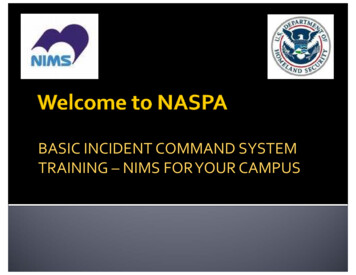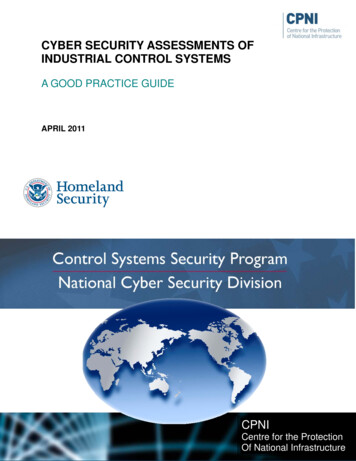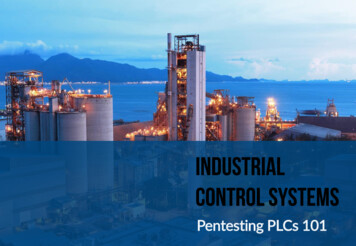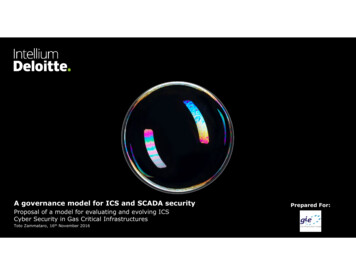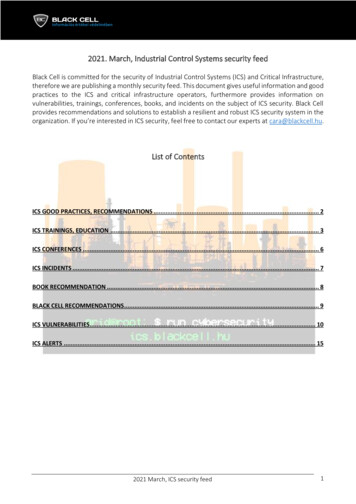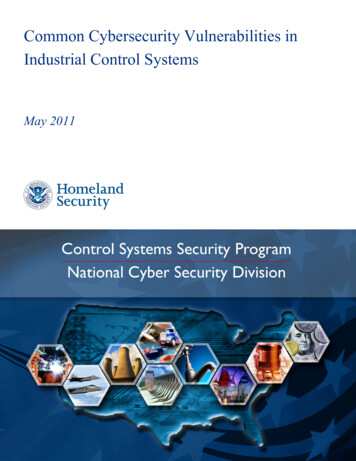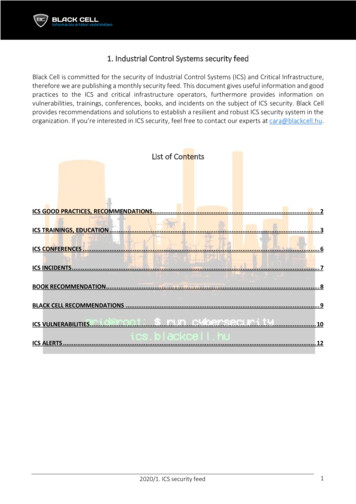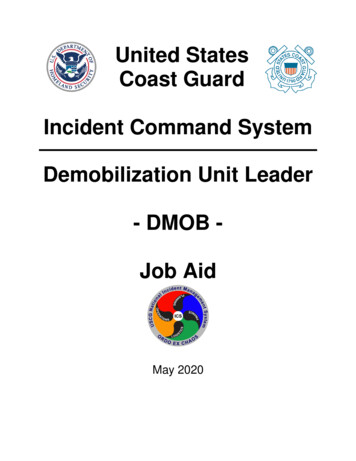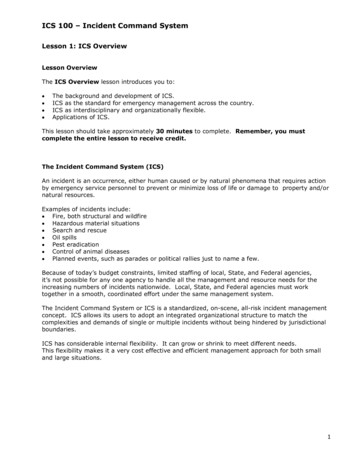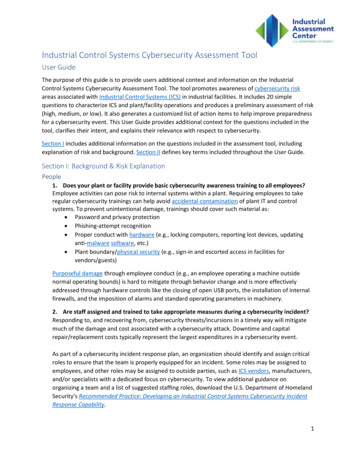
Transcription
Industrial control system(ICS) securityContents1. Operations technology and ICS2. Threat to ICS sector3. Adapting standards4. How PwC can helpOperations technology and ICSOperations technology (OT) is the term used in industrialoperations. It comprises control systems, networks and otherindustrial automation components that control physical processesand assets. Control systems are at the heart of the nation’s criticalinfrastructure, which includes electric power, oil and gas, waterand waste water, manufacturing, transportation, agriculture andchemical factories.ICSs, which are a part of the OT environment in industrialenterprises, encompass several types of control systems, includingsupervisory control and data acquisition (SCADA) systems,distributed control systems (DCSs), and other smaller controlsystem configurations such as programmable logic controllers(PLCs), remote terminal units (RTUs), intelligent electronic devices(IEDs) and other field devices.ICSs were originally designed to increase performance, reliability and safety by reducing manual effort. Security was achievedby physical isolation, or a so-called air gap (security by obscurity).Today, the world is talking about connecting everything to the Internet. The fourth industrial revolution (Industry 4.0), a termused to draw together cyber-physical systems, the Internet of things (IoT) and Internet of services, has started to find moreresonance with OEMs, system integrators and asset owners. Thus, it is only a matter of time before a lot of ICS information isrouted to sophisticated applications across enterprises through a wide area network where security by obscurity no longer offersvalid protection. Governments plan to connect ICSs to the Internet for projects such as smart grids and smart cities, which willsignificantly increase the risk of intrusion from malicious actors.Threat to ICS sectorWith ICS increasingly getting integrated with the corporate network and Internet to meet business requirements, the sector isobviously opening itself to the world of attackers. This is evident from many global information security surveys, including thewidely followed one by ICS-CERT. As highlighted in the figure below, almost all critical infrastructure is targeted.There are two major types of security threats associated with ICS:Inadvertent Safety failuresNatural disastersEquipment failuresHuman mistakesDeliberate Disgruntled employeesIndustrial espionageCyber hackersViruses and wormsTerrorismwww.pwc.in
Communications 83%Commercial facilities 63%Chemical 43%Criticalmanufacturing 6426%Unknown 167%Water 135%Transportation 125%Nuclear 62%Information technology 42%Energy 8132%Healthcare 156%Food and agriculture 21%Finance 31%Government facilities 94%Source: ICS CERTICSs have various weaknesses, which make them easy targets for attackers:Legacy control systemLack of cyber securityconsiderations in networkarchitecture/segmentationPoor network protocolimplementationWeak network componentconfigurationPlain text trafficInsecure encryption andauthentication for wirelessICS networksWeak protection of ICSsystems from the enterpriseIT networkPoor programming andcode qualityVulnerable web servicesPoor passwords practices andweak authenticationInsecure remote connectivityto ICS networksNo integrity checks at criticalasset levelPoor patch managementLeast user privilege violationWith cyberattacks continuing to escalate in frequency, severity and impact year after year, ensuring the cyber security of thesesystems is of paramount importance.
Legacy control systemAdapting standardsTo overcome ICS threats, many government agencies, non-profit organisations and nation states have developed differentstandards over the years. A few of the standards are country specific, while a few others are globally applicable.These standards provide guidance for developing ‘defence-in-depth’ strategies to organisations that use ICS components. Thesestandards provide information related to secure configuration, best practices, security policy, secure network architecture andsecure operating procedures.Three factors are very critical to these standards: process, technology and people. Together, they are responsible for the securityof the system.PeopleHow are peoplefollowing theprocesses?SecurityHow is the solutiondeployed, operatedand maintained?What is technicallyimplemented in theautomation solution?ProcessTechnologyIn India, the National Critical Information Infrastructure Protection (NCIIPC) guidelines are used by the public and privatesectors to secure the critical national infrastructure.Number of Controls: 12Controls required to be assessed at the conceptualization and designstage to ensure that security is taken as a key design parameter for all newCII.Number of Controls: 6Planning lsOperational ControlsControls required to translate the design/conceptualization to adequate andaccurate security configurations. These controls also come into play in case ofretrofitting existing, unprotected/poorly protected CII.Number of Controls: 11Controls required to ensure that security posture is maintained in theoperational environment. These controls also come into play in case ofretrofitting existing, unprotected/poorly protected CII.BCP / DR ControlsReporting andAccountability ControlsNumber of Controls: 3Controls required to ensure minimum downtime, as well as to ensure thatthe restoration process factors in, and overcomes the initial vulnerabilities, toensure graceful degradation/minimum maintenance of service provided by CII.Number of Controls: 3Controls required to ensure that adequate accountability andoversight is exercised by Senior management, as well as reposting toconcerned Government agencies when required.
Global ICS security standards:IEC- 62443GlobalStandardsNIST SP800 - 82IEC 61508ANSSIDHS - CSSPRecommended PracticesCPNI - Process Control andNIST - Framework for Improving CriticalInfrastructure CybersecurityENISA - Protecting IndustrialControl SystemsISO/IEC TR 27019API - API 1164 PipelineEnergySCADA SecurityNERC - CriticalInfrastructure ProtectionDoE - Cyber Security ProcurementIAEA - Computer Securityat Nuclear FacilitiesDoE - 21 steps forSCADA securityNISTIR 7628IEC 62351ENISA - Appropriate security measures forsmart gridsLanguage for Control Systems VersionNuclearSCADA securityNRC - Regulatory Guide5.71NRC - 10 CFR - 73.54Each sector faces different challenges and threats, and the standards vary accordingly. For example, NERC CIP applies to theenergy sector, while a few standards are globally applicable, such as IEC 62443.How PwC can help1Strategy and governance2345Security architecture678Defining a comprehensive cyber security strategy, prioritising investments and aligning security capabilities with strategicimperatives of the organisationDefining business-driven security architecture to protect business critical informationSecurity implementationAn integrated approach towards selecting and implementing security solutionsThreat and vulnerability management (TVM)Establishing a TVM programme to protect, detect and respond to vulnerabilities in technologiesRisk and complianceEffective management of compliance with organisational policies and industry-specific regulatory requirements andstandard like NIST and IEC62443Incident managementEstablishing a cyber response framework to contain security incidents and minimise damageManaged servicesEstablishing and managing best-in-class security operations centres for clientsIdentity and access managementTaking into account business requirements and trends to provide a holistic view for managing and maintainingidentities
PwC tailors its services based on the sector and its criticality. PwC provides cyber security services to increase the securityposture of your ICS/OT systems from threats. Some of the services are as follows:1) ICS risk assessmentsAs a first step, we conduct a security assessment of the ICS infrastructure based on custom or relevant standards to assess thecurrent state vs security best practices.The assessment covers system records and activities to determine the adequacy of system controls. The activities include areview of network architecture and network security systems configuration to assess the operating efficiency of technicalcontrols.2) ICS vulnerability assessment (VA)/penetration testing (PT)Our cyber security team is well versed with the ICS environment and its challenges. We have subject matter experts in VA/PT ofICS components.A three-step approach is followed to examine the ICS security posture: Test ICS network from the Internet Test ICS network from IT Testing selected offline ICS systems for vulnerabilities3) Compliance assistanceSource: ICS-CERT USPwC can help industries in adapting the international and country-specific security standards mentioned in a previous sectionof this document. We can also can help industries to develop their own ICS standards and policies based on the environment’scriticality.4) Security operations centre (SOC):PwC provides services SOCs to set up a combined ICS-IT environment, which will enable you to monitor and act upon the treatsand attacks.
About PwCAt PwC, our purpose is to build trust in society and solve important problems. We’re a network of firms in 157 countrieswith more than 2,08,000 people who are committed to delivering quality in assurance, advisory and tax services. Findout more and tell us what matters to you by visiting us at www.pwc.comIn India, PwC has offices in these cities: Ahmedabad, Bengaluru, Chennai, Delhi NCR, Hyderabad, Kolkata, Mumbaiand Pune. For more information about PwC India’s service offerings, visit www.pwc.com/inPwC refers to the PwC International network and/or one or more of its member firms, each of which is a separate,independent and distinct legal entity in separate lines of service. Please see www.pwc.com/structure for further details. 2016 PwC. All rights reservedContactsSivarama KrishnanLeader, Cyber SecurityTel: 91 (124) 626 6707sivarama.krishnan@in.pwc.comHemant AroraExecutive Director, Cyber SecurityTel: 91 (124) 626 6717Hemant.arora@in.pwc.comSiddharth VishwanathPartner, Cyber SecurityTel: 91 (22) 66691559siddharth.vishwanath@in.pwc.comPVS MurthyExecutive Director, Cyber SecurityTel : 91 (22) 66691214pvs.murthy@in.pwc.comManu DwivediPartner, Cyber SecurityTel: 91 (0) 80 4079 7027manu.dwivedi@in.pwc.comSundareshwar KrishnamurthyPartner, Cyber SecurityTel: 91 (22) 6119 ta Classification: DC0This document does not constitute professional advice. The information in this document has been obtained or derived from sources believed by PricewaterhouseCoopersPrivate Limited (PwCPL) to be reliable but PwCPL does not represent that this information is accurate or complete. Any opinions or estimates contained in this documentrepresent the judgment of PwCPL at this time and are subject to change without notice. Readers of this publication are advised to seek their own professional advicebefore taking any course of action or decision, for which they are entirely responsible, based on the contents of this publication. PwCPL neither accepts or assumes anyresponsibility or liability to any reader of this publication in respect of the information contained within it or for any decisions readers may take or decide not to or fail totake. 2016 PricewaterhouseCoopers Private Limited. All rights reserved. In this document, “PwC” refers to PricewaterhouseCoopers Private Limited (a limited liabilitycompany in India having Corporate Identity Number or CIN : U74140WB1983PTC036093), which is a member firm of PricewaterhouseCoopers International Limited(PwCIL), each member firm of which is a separate legal entity.MJ/August2016-7136
PwC provides cyber security services to increase the security posture of your ICS/OT systems from threats. Some of the services are as follows: 1) ICS risk assessments As a first step, we conduct a security assessment of the ICS infrastructure based on custom or relevant standards to assess the current state vs security best practices.
